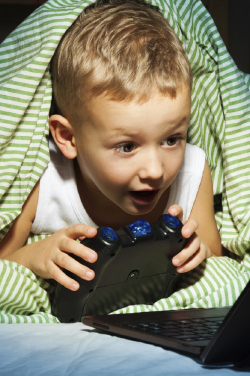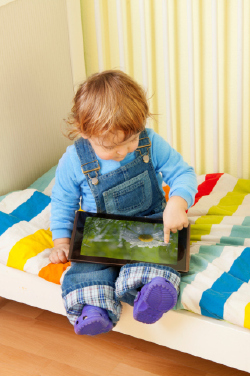
Are your children's games causing them pain?
The use of modern technology could cause crippling back pain for our children in the future, finds new research.
More than two-thirds of primary school children have reported experiencing back or neck pain over the course of one year, according to the research. Sixty-four per cent of secondary school children have suffered problems over a similar period and almost 90 per cent of the children have not reported their pain to anyone.
The results appear in a questionnaire-based study drawn from interviews with primary and secondary school children, conducted with full parental consent. The findings underline a growing concern among the medical community about the effects of computers, games consoles, smart-phones and iPad-style tablets on young people’s developing bodies. The children's activities could lead to debilitating health problems that have been described by one expert as a "healthcare time bomb".
 Incorrect posture could affect them later in life
Incorrect posture could affect them later in lifeThe research was commissioned by Abertawe [Swansea] Bro Morgannwg University (ABMU) Health board and was conducted by Helena Webb, a leading paediatric physiotherapist. In the study 204 children from the ages of 7-18 were questioned in an in-depth survey about their back care. The research was carried out after the ABMU reported that the number of children receiving treatment for back and neck pain had doubled over six months. The percentage of paediatric referrals to physiotherapy for back/neck pain increased from 2.1 per cent in September 2011 to 4.5 per cent in March 2012.
Lorna Taylor BSc (Hons) Physiotherapy, MCSP, HPCP said: “Modern lifestyles and the increase in technology are having detrimental effects on our children’s musculoskeletal health and if not addressed in school and at home now, will have far reaching effects for our children, the future working generation and society. This is a healthcare time bomb.
 Is a home table causing them back pain?
Is a home table causing them back pain?“It's vital we instil good habits and provide resources so children can be comfortable, be able to concentrate, reach their full potential and work and play sport as they decide, and not be limited by preventable disability and a life in pain.”
Jon Abbott, managing director – ergonomics and safety at Cardinus Risk Management, said:
“For many years we have recognised the risk of ergonomics injuries to adults in the workplace, and Government advice on Display Screen Equipment has long targeted adults. But now our younger generations are using technology more regularly at school and home and yet we are failing to recognise and address the risks. It cannot be right that we work so hard to protect the working population but fail to recognise the impact technology has on children at a critical stage of their physiological development.
“It’s important that we raise children’s awareness of the importance of healthy spine posture, at school and at home. The long-term benefits are many and varied; the cost of failing to address musculoskeletal problems in children could be high. School is where children spend a large proportion of time every week and the health and safety considerations that apply to adults in the respect of technology, seating, lifting and carrying, should also apply to children. They are also at risk from the bad habits they develop at home.”
The findings coincide with the launch of a free e-learning tool, Healthy Working MOVE, which has been developed by Cardinus Risk Management in conjunction with Matt Birtles of the Health & Safety Laboratory, and Lorna Taylor, a paediatric physiotherapist with 12 years’ experience, and the founder of Jolly Back. Healthy Working MOVE explains to young people how using electronic devices, carrying school bags and adopting different postures when working and relaxing can affect their bodies. It teaches them how to use technology comfortably and safely.
Healthy Working MOVE will help to promote safe practices among children and young people at home and at school. The e-learning programme will be offered free-of-charge to every primary school, secondary school and college in the UK. It has been developed by Cardinus Risk Management in partnership with the Health and Safety Laboratory.
The e-learning tool is based on the award-winning course Healthy Working that helps to protect adult workers around the world. The information, advice and guidance in Healthy Working MOVE has been designed and presented to appeal to children and young people in ways that will have strong appeal for children and young people. There is a version for primary school children, a version for secondary school children and another for students in higher education.
 Heavy school bags could also contribute
Heavy school bags could also contributeSara, aged 14 explains: “On a scale of one to 10, I would rate my back pain at around eight. It has affected my life by stopping me from doing the things I love to do, like running and participating in spin classes. It also means that I can't stand up for or sit comfortably for long periods. I thought the pain was genetic, because my Mum also suffers from back pain, but even though that may have contributed to it, I have an enhanced curve in my spine which is caused by my posture.
“To reduce the pain, I went to hydrotherapy and a block of pilates classes and came out with more of an idea of how to ease the pain. Now, my back is still very painful but the rating is probably around a 6.5. Carrying my school bag, which is very heavy, doesn’t help, but I have been told to carry it further up my back with heavier things at the back so that it’s not pulling my spine down as much.”
Back pain among children is not new; previous studies have shown similar issues. In 1994 a study of school children in Scandinavia revealed that 41.6 per cent suffered back pain while sitting in class and 30 per cent reported pain after sitting for less than one hour. Twenty years on very little has been done to protect children and the statistics appear to be getting worse.
Jon Abbott, managing director – ergonomics and safety at Cardinus Risk Management, added: “Healthy Working MOVE will teach children how to stay comfortable and safe by using technology sensibly, sitting properly when working and relaxing and managing their school bags correctly.
“We all want to protect our children and spare them pain and discomfort, but as a successful business we also see them as the workforce of the future. By acting now to educate them about healthy working we are potentially preventing a catastrophic and expensive problem in years to come.”
Tagged in Health back pain children's health

